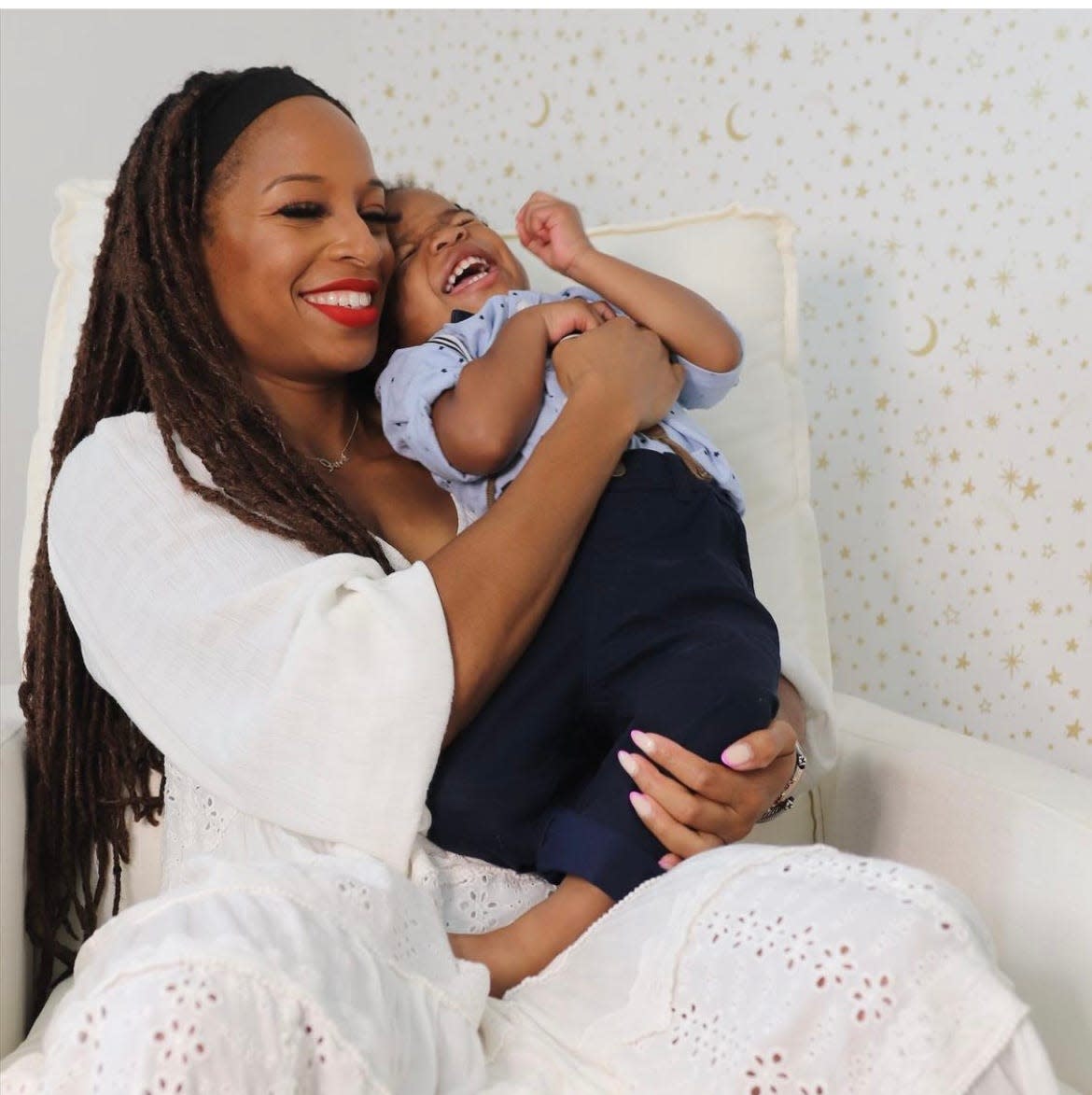'I am smart, I am beautiful, I am loved': Olympian Natasha Hastings prioritizes mental health
Natasha Hastings wakes up 30 minutes before her toddler in the mornings, says a prayer and recites "I am" affirmations to show up as her best self daily.
"I am smart, I am beautiful, I am loved."
The two-time Olympic gold medalist in track and field is getting her master's degree in clinical mental health at the University of South Carolina. She serves as a graduate assistant for the track and field team and is a single parent.
Although Hastings wears many hats, including mom, athlete, student and coach, she avoids using the word "balance" because she doesn’t think balance truly exists. Instead, she “finds her flow” each day, giving an all-or-nothing approach in each facet of her busy life.
STAY UP-TO-DATE:Subscribe to our Sports newsletter now!
A non-negotiable part of Hastings’ bustling routine includes weekly therapy.
"I could be in the middle of working on something or at practice and that is literally the one thing that I have no shame in or fear when I say, 'Hey, guys, I gotta' put a button on this because I have therapy.' This is one thing that is part of my self-care," Hastings, the 400 and 4×400 meter relay champion, told USA TODAY Sports.
Hastings is part of a growing number of athletes, from Simone Biles to Naomi Osaka to NFL players and beyond, who are prioritizing their mental health. In many ways Hastings and others are part of a movement that's changing sports and will continue to do so for years.
More: Naomi Osaka leaves IMG to launch own sports agency, Evolve
More: WNBA's Diana Taurasi vows to keep playing: 'When I'm done playing I'm just going to stop playing.'
Hastings journey into therapy came naturally. She saw a sports psychologist during her collegiate track career and immediately saw the benefits.
"I think every athlete goes through the 'what is life after sport?' phase," Hastings said. "Honestly, when I went to undergrad at (South) Carolina, I thought I was going to be a chiropractor, and then there was the track thing, and I ended up being really good. So the question of what was next for me came up when I got into therapy very shortly after my son's father and I broke up.
"I've had experiences with a psychologist throughout my professional career and even in college I worked with a sport psych but this was the first time that like I got into therapy specifically for me, my personal issues, traumas and things that I felt like I need to heal from off of the track."
Hastings' decision to prioritize therapy ultimately led to her pursuing a degree and career in the field. Then came a larger discovery.
"When the 2020 Games were postponed because of the pandemic, I'm sitting in therapy and I'm like, 'You know what? I feel like that's what I want to do.' I intentionally Googled black female therapists in Austin, Texas. Because up until this point, I've never had a black therapist nor a female. It's always been older, white men and upon doing further research I was like, 'Yeah, there's not very many of us in the field.' "
Hastings knew to make a true impact in the communities she wished to serve, she would need to become the Black female therapist she did not see in the industry.
"It's not to say that I don't love my program. I love it," said Hastings. "I'm actually excited to go to class and I enjoy my cohort. But it is quite obvious that we as Black people are not represented in the material and I have to get that education elsewhere."
Hastings calls herself a stickler when it comes to bedtime for her two-year-old son, Liam, because it means she’s finally made it to the part of the day where she can solely focus on herself.
"We all thrive off of routine and when he goes to bed at night, that hour after he goes to bed – that is my time and I don’t do anything," said Hastings. "So when he goes to bed that first hour, if I still have work to do, I have to take that out for myself."
"I don't believe that because I'm a mom I have to engage in self-betrayal," said Hastings. "I do raise my son with the mindset of one day he’s going to grow up and leave me. I am raising a boy to grow up and go into the world on his own. And so with that in mind, it's important that I also take care of myself."
More: WNBA players can support Brittney Griner by not playing in authoritarian nations | Opinion
Hastings also hopes her story will spark more conversations of the duality of being a mom and an athlete.
"Motherhood has a place across all sports and I think whether we realize it or not," she said, "it pours over into the other aspects of our lives."
Contact Analis Bailey at [email protected] or on Twitter @analisbailey.
This article originally appeared on USA TODAY: Olympic gold medalist Natasha Hastings prioritizes mental health
Source: Read Full Article


